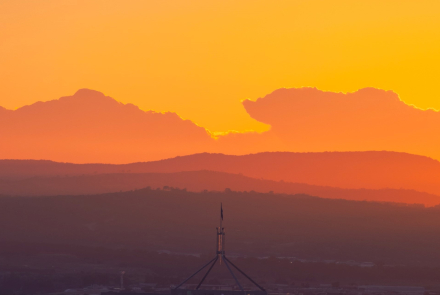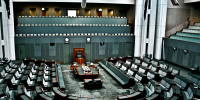
Photo by Maxwell Ingham on Unsplash
Ask what you can do for your country
As the second year of the pandemic comes to an end, Policy Forum Editor-in-Chief Quentin Grafton asks Australia’s leaders to put the public interest first, show integrity in leadership, and support transparency and accountability.
More than 60 years ago, in his inauguration speech, United States President John F Kennedy asked his fellow Americans to “ask not what your country can do for you — ask what you can do for your country”. Today, in Australia, and in some other democracies, we need to ask the same of our leaders.
As the pandemic continues, the gaps between the rich and poor are becoming crevasses. ‘Business as usual’ is not working for the poor and marginalised. To Australia’s shame, those living in the poorest areas have died at more than twice the rate as those living in the best-off areas as a result of the pandemic. This was also true in other high-income countries such as the United Kingdom and the United States, among others.
In Australia, a failure to adequately protect persons in aged care and insufficient federal funding in the sector contributed to most of the COVID-19 fatalities in 2020 and higher infection rates for aged-care residents.
Then in 2021, a failure to plan ahead and to effectively prioritise the most vulnerable for vaccinations contributed to an initially large gap in vaccination rates between Indigenous and non-Indigenous Australians.
Those 60 years and older and fully vaccinated with AstraZeneca have also just discovered they may have very little protection against infection from the Omicron variant. Yet these vulnerable Australians must wait five months from their second dose, while in the United Kingdom, in response to Omicron, boosters are now available after just three months.
Adding insult to injury, during the pandemic disadvantaged households and those already experiencing poverty suffered the most from job losses, as did women. This is despite the use of temporary and supplemental welfare payments and wage subsidy schemes in high-income countries, such as Australia, as the pandemic hit.
By contrast, the pandemic has coincided with an almost once-in-a-lifetime increase in the value of assets, be they properties or shares. While inheritances may reduce wealth disparities for some in Australia, those who experience intergenerational disadvantage and the three per cent of Australians in persistent poverty, including many First Nations Australians, miss out.
And when we think about inequality in Australia, we can’t forget the 400,000 disadvantaged Australians who had to pursue class action over the ‘robodebt’ to have returned to them $720 million that was unlawfully taken from them by their federal government.
Yet, some $27 billion of tax free money, or almost 40 per cent of the expenditures through the JobKeeper scheme, was handed out to Australian businesses whose revenues increased during the pandemic.
The global ‘bubble bonanza’ coincident with the pandemic has benefited the wealthiest the most, some of whom pay no income taxes, while globally 100 million additional people have fallen into extreme poverty in the past two years.
Income inequality has increased globally. The average income of the top 10 per cent of earners has increased from 8.5 times to 15 times the average income of the bottom 50 per cent of earners over the past two decades. In Australia the top 10 per cent earn 10 times more, and this number is growing.
In June 2021, G7 leaders responded to the pandemic with a global action agenda to ‘build back better’. This agenda includes a focus on climate-friendly investments (in keeping with the Paris Climate Agreement) and will, according to United States President Joe Biden, also include ”high standards and principles…relating to the environment and climate, labor and social safeguards, transparency, financing, construction, anticorruption, and other areas.”
Higher standards and more principled behaviour must also be demanded of our leaders. In November 2021, Australia’s Sex Discrimination Commissioner presented her inquiry on commonwealth parliamentary workplaces. Her inquiry was triggered by an allegation, made public in February 2021, of a rape that allegedly took place in 2019 in a parliamentary office.
The inquiry also followed an announcement by the then Attorney General in March 2021 that he was the unnamed cabinet minister accused of a separate rape – which he has vigorously denied – that allegedly occurred in 1988.
The Commissioner found that of the 935 individuals who participated in an online anonymous survey for her inquiry who are currently working at the parliament, one third had experienced some form of sexual harassment while at their current workplace.
One person who submitted to the inquiry observed: “[t]here are no ramifications for bad behaviour because there is no risk of MPs getting fired, or otherwise being held accountable for their actions”.
Bad behaviour and a lack of integrity in federal politics is not limited to bullying and sexual harassment.
Since the last Australian federal election in 2019 we have learned of seemingly countless ‘rorts’ of public money, including sports facilities, parking lots, and a regional jobs scheme that included breaches of conflict of interest guidelines.
These three incidents alone misdirected hundreds of millions of taxpayers’ dollars for what is known as ‘pork-barrelling’, the distribution of taxpayers’ money for political gain.
Pork-barrelling has become so accepted, at least by some, that it was openly endorsed by the Deputy Prime Minister, who said “I suppose if you’ve got to make a choice (between being seen as ineffective or as pork-barrelling) it’s, ‘I better run with pork-barrelling’.”
A state premier in 2021, when asked about pork-barrelling, justified it on the basis that it was “not an illegal practice”. A state deputy premier even stated in 2019 that he was happy to be nicknamed ’Pork Barrel-aro’.
It’s no coincidence that those public institutions charged with discovering malfeasance, such as the Australian National Audit Office, or exposing the truth, such as the public Australian Broadcasting Corporation (ABC), have had their budgets cut.
In the case of the ABC, its chair described a new inquiry established by the Senate Standing Committee on Environment and Communications as “…political interference designed to intimidate the ABC and mute its role as this country’s most trusted source of public interest journalism”.
If Australia is to build back better, leaders must put the interests of their country first, not themselves or their donors.
It cannot be that leaders excuse away their responsibilities with fabrications and obfuscations. Yet ministers found to have breached ministerial standards in one year can return to Cabinet the next and properly and legally constituted inquiries in the public interest are denounced as a ‘kangaroo court’ by the prime minister.
When the federal government refuses to act to create well-functioning National Integrity Commission, Australians should be very concerned. A federal integrity commission ’with teeth’ is desperately needed to ‘keep the bastards honest’ and identify bad behaviour, regardless of the perpetrator’s political persuasion.
Trust, integrity, and ethical behaviour are the basis of a successful Westminster system of governance, while lies and ‘post-truth’ attitudes damage democracy and our futures. Without integrity at the top, the public interest will not be served and social, economic, and environmental injustices will simply go on forever. And it’s not only justice that’s at stake – integrity is the foundation of a well-functioning market economy, because civil ethics and prosperity go together.
At the ballot box, and between elections, politicians and those that serve them must be held accountable. Without checks and balances, and integrity in public life, Australia and other democracies will increasingly become a ‘trough’ where the influential few feeds at the expense of taxpayers and consumers, with little or no regard to the public good. As we enter the third year of the COVID-19 pandemic, and at this moment more than ever, “now it’s time to build – to create the world we want.”
Updated: 17 July 2024/Responsible Officer: Crawford Engagement/Page Contact: CAP Web Team













